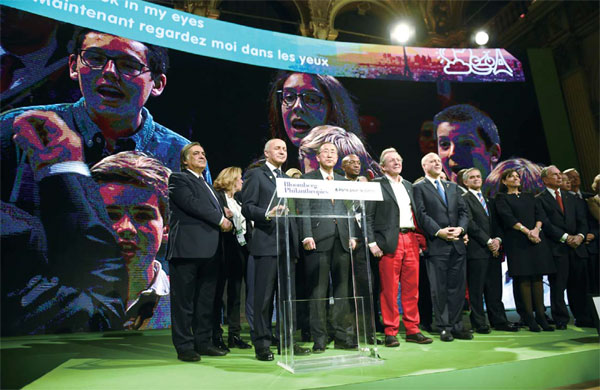Good momentum of climate talks must be maintained
Updated: 2015-12-15 08:05
By Fu Jing(China Daily)
|
||||||||
 |
|
Climate change talks have reached a crucial stage and negotiators are scrambling to secure a deal. Alain Jocard. [Photo/For China Daily] |
Global politicians, their teams and advisers in Paris had very good reasons to pack for home in a positive frame of mind, as they have avoided a failure like Copenhagen and successfully reached a legally binding agreement to fight climate woes.
They have made this historic moment possible after extensive wrangling over the past two weeks. Chinese president Xi Jinping and US President Barack Obama, as the leaders of the two largest emitters, paved the way for success with their earlier climate commitments. They gave the day-and-night talks a boost with their shared desire to see an agreement reached.
The deal aims to hold global temperatures to a maximum rise of 1.5 C above pre-industrial levels, which if achieved would stave off the worst effects of catastrophic global warming. Richer countries have also pledged financial assistance to help poorer countries adapt to climate change.
Reading through the 32-page Paris agreement, one understands most of the commitments are agreed promises, which means concrete follow-up actions will be needed to produce substantive effects.
But if the agreement is implemented fully, it may be able to avoid some catastrophic disasters, especially in those countries, such as vulnerable island countries and countries in Africa and other less developed regions, which have less capability to cope with the consequences of global warming.
There has already been a 1 C rise over pre-industrial levels and this has caused a significant rise in sea level, devastating droughts and flooding, and these effects are likely to get worse as temperatures continue to rise. For the most vulnerable countries, the rising sea level and extreme weather events already pose serious threats. They badly need financial support and technical capacity building to mitigate and adapt to climate change.
The developed countries have agreed to continue through 2025 their existing collective mobilization goal of $100 billion per year to help developing countries enhance the implementation of their policies, strategies, regulations and action plans with respect to both mitigation and adaptation.
But this was a commitment they made at Copenhagen, and failed to fulfill. In fact, there is a general lack of timescales in the agreement and no clear deadlines for specific aims.
The negotiators have already promised to settle some problems in November next year when another round of United Nations climate talks is scheduled. However, the issue of financial support cannot be delayed and it should be discussed at the start of next year.
What's more, if urgent actions are taken in this regard, the cooperative momentum of the Paris talks could be renewed and snowball.
One of the biggest achievements of the Paris talks has been the collective recognition that climate change represents an "urgent and potentially irreversible threat to human societies and the planet" and so requires the widest possible cooperation by all countries.
The shared will and participation to agree on "an effective and appropriate international response" to curb global greenhouse gas emissions and the promises to uphold and promote regional and international cooperation in order to mobilize stronger and more ambitious climate action by all stakeholders is a positive development. It came as agreement has overtaken disagreement in the global community in its promise to hand down a sustainable global village to the generations to come.
Apart from the specific content of Paris Agreement, in a world bombarded by terrorism attacks, economic woes and geopolitical conflicts, the additional legacy of the two-week talks in Paris is that they have shown the international community can sit down together and reach compromises on ways to address a common global challenge.
The author is China Daily chief correspondent in Brussels. fujing@chinadaily.com.cn
- Global health entering new era: WHO chief
- Brazil's planning minister steps aside after recordings revelation
- Vietnam, US adopt joint statement on advancing comprehensive partnership
- European border closures 'inhumane': UN refugee agency
- Japan's foreign minister calls A-bombings extremely regrettable
- Fukushima impact unprecedented for oceans: US expert

 Stars of Lijiang River: Elderly brothers with white beards
Stars of Lijiang River: Elderly brothers with white beards
 Wealthy Chinese children paying money to learn British manners
Wealthy Chinese children paying money to learn British manners
 Military-style wedding: Fighter jets, grooms in dashing uniforms
Military-style wedding: Fighter jets, grooms in dashing uniforms
 Striking photos around the world: May 16 - May 22
Striking photos around the world: May 16 - May 22
 Robots help elderly in nursing home in east China
Robots help elderly in nursing home in east China
 Hanging in the air: Chongqing holds rescue drill
Hanging in the air: Chongqing holds rescue drill
 2.1-ton tofu finishes in two hours in central China
2.1-ton tofu finishes in two hours in central China
 Six things you may not know about Grain Buds
Six things you may not know about Grain Buds
Most Viewed
Editor's Picks

|

|

|

|

|

|
Today's Top News
Liang avoids jail in shooting death
China's finance minister addresses ratings downgrade
Duke alumni visit Chinese Embassy
Marriott unlikely to top Anbang offer for Starwood: Observers
Chinese biopharma debuts on Nasdaq
What ends Jeb Bush's White House hopes
Investigation for Nicolas's campaign
Will US-ASEAN meeting be good for region?
US Weekly

|

|







